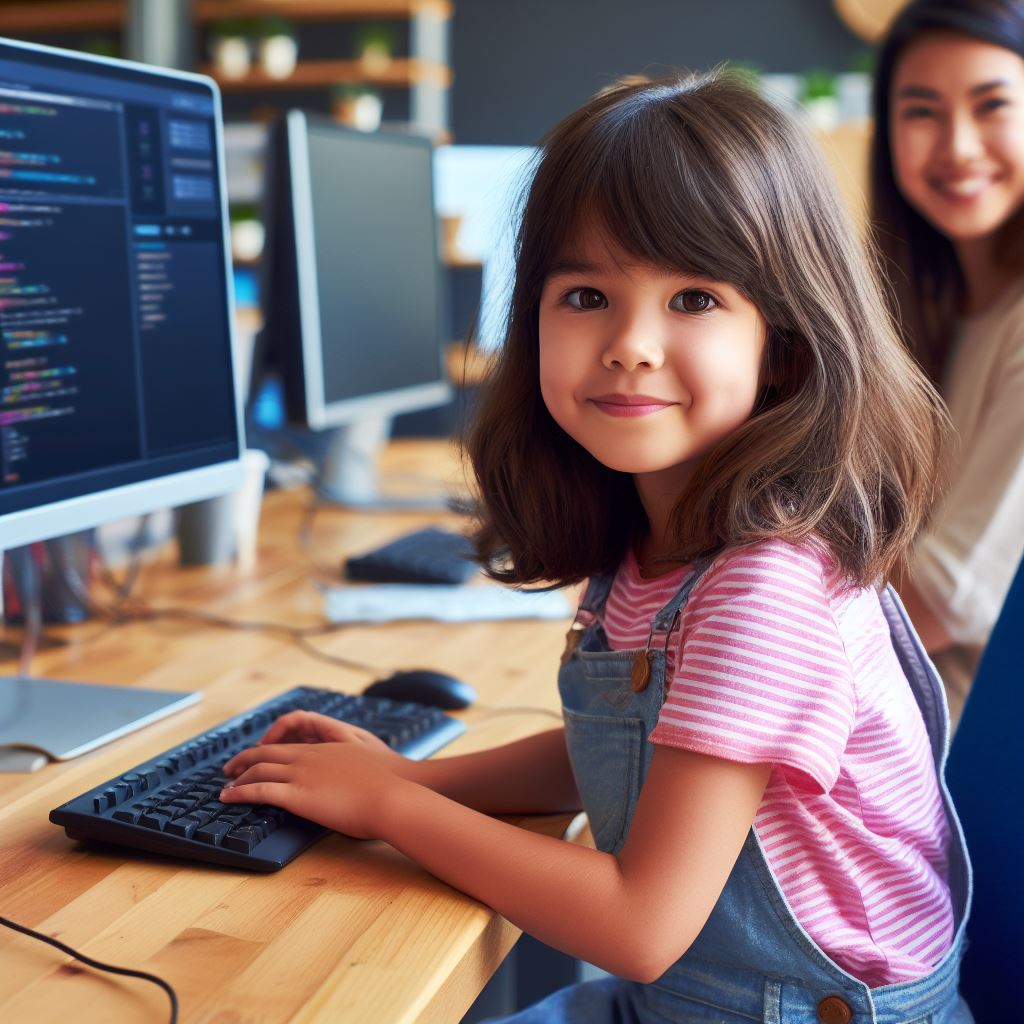What to Expect: A Week at a Coding Camp for Kids
Last Updated on October 6, 2023
Introduction
Coding camps for kids are becoming increasingly popular as parents recognize the importance of computer literacy skills. This blog post aims to provide an overview of what a week at a coding camp entails.
When parents send their children to coding camps, they often wonder what activities and learning experiences their kids will engage in.
This blog post will shed light on what kids can expect in a week at a coding camp.
Throughout the week, campers will learn the fundamentals of coding through hands-on activities and projects. They will explore various programming languages and develop problem-solving skills.
Each day begins with a brief introduction to the day’s concepts, followed by interactive lessons. Kids will have the opportunity to ask questions and engage in discussions with their fellow campers.
The camp will provide a supportive environment where kids can collaborate and learn from each other. They will work in teams to tackle coding challenges and create their own projects.
Exciting field trips to tech companies or innovation labs may be organized during the week. These outings allow campers to see how coding is applied in real-world situations and inspire them.
By the end of the week, kids will have developed a basic understanding of coding principles and be able to create simple programs.
They will receive certificates of completion, acknowledging their hard work and dedication.
In essence, a week at a coding camp for kids offers a dynamic and immersive learning experience. It equips children with valuable skills while fostering creativity, problem-solving abilities, and teamwork.
Day 1: Getting Started
On the first day of coding camp, we kick things off with exciting activities and icebreakers to get the campers engaged and excited about coding. Here’s how the day unfolds:
Initial Activities and Icebreakers
- Introduce campers to each other through fun icebreaker games to break the ice and create a sense of camaraderie.
- Organize team-building activities, such as group challenges, to foster collaboration and teamwork among the campers.
- Share success stories of young coders to inspire and motivate the campers as they start their coding journey.
Getting Familiar with Coding Language and Concepts
We understand that coding may be new to some campers, so we begin by laying the groundwork:
- Provide an overview of the coding language that will be used during the camp, explaining its importance and relevance in the tech industry.
- Teach basic coding concepts, such as variables, loops, and conditionals, through interactive activities and demonstrations.
- Encourage campers to ask questions and seek clarification to ensure they have a solid understanding of the fundamental coding principles.
Tools and Software Used during the Coding Camp
To create a dynamic and immersive learning experience, we utilize various tools and software:
- Introduce campers to integrated development environments (IDEs) like Scratch or Python IDE, which help simplify coding and provide a user-friendly interface.
- Showcase coding platforms such as GitHub, where campers can collaborate, share, and showcase their projects with fellow coders.
- Explore online coding resources and tutorials to supplement the campers’ learning and help them practice coding skills outside of the camp.
By the end of Day 1, our campers will have a solid foundation in coding language and concepts, as well as the tools they’ll be using throughout the coding camp.
They’ll be ready to dive deeper into coding and embark on an exciting journey of creativity and innovation!
Read: Coding Wallpapers for Mobile: Keep Inspired On-The-Go
Day 2: Learning the Basics
Lessons and activities focused on teaching the basics of coding
- The second day at our coding camp for kids was all about teaching the basics of coding.
- We started with an interactive lesson on variables, explaining their importance in storing and manipulating data.
- Next, we delved into loops, demonstrating how they allow for repetitive execution of code blocks.
- After loops, our instructors covered conditionals, showcasing how they enable decision-making within a program.
- Finally, we introduced the concept of functions, showing campers how to break down code into reusable pieces.
Hands-on projects or coding challenges the campers might be working on
- Throughout the day, the campers enthusiastically participated in various hands-on activities and coding challenges.
- One of the projects involved creating a simple calculator program, where campers could practice using variables and conditionals.
- Another challenge required the campers to design a program that would print a pattern of stars using loops.
- These projects and challenges encouraged teamwork, critical thinking, and problem-solving skills among the campers.
- By the end of the day, the campers had a solid understanding of the basics of coding and were ready to explore more advanced concepts.
Read: Cost of Coding Camps: Investment or Expense?
Day 3: Exploring Different Programming Languages
On the third day of the coding camp, the campers will be exposed to various programming languages. This exciting session will broaden their horizons and open up new possibilities for their coding journey.
Highlighting the Exposure
The coding camp understands the importance of exposing young minds to different programming languages.
By familiarizing them with a range of languages, the camp aims to nurture their curiosity and passion for coding.
The Benefits of Learning Multiple Programming Languages
There are several benefits to learning multiple programming languages:
- Improved Problem-Solving Skills: Each programming language has unique features and syntax, enabling campers to approach problems from different angles.
- Enhanced Adaptability: Learning multiple languages equips campers with the ability to switch between frameworks and technologies effortlessly.
- Increased Job Opportunities: By mastering multiple languages, campers expand their career prospects and stand out in the competitive tech industry.
- Broadened Creativity: Exposure to multiple languages stimulates campers’ creativity and encourages them to think outside the box.
Languages to Explore and Try
During the camp, campers may get the chance to explore and try various programming languages, including:
- Python: Renowned for its simplicity and versatility, Python is an excellent language for beginners.
- JavaScript: An essential language for web development, JavaScript enables campers to create dynamic and interactive websites.
- Java: Widely used in enterprise-level applications, Java offers campers a strong foundation in object-oriented programming.
- C++: Known for its performance and efficiency, C++ is ideal for developing software and game engines.
- Ruby: With its elegant syntax, Ruby allows campers to focus on problem-solving instead of complex syntax rules.
Additionally, campers may have the opportunity to explore languages such as Swift, PHP, and C#, depending on the camp’s curriculum and resources.
By exposing campers to various programming languages, the coding camp provides them with a well-rounded coding education.
This exposure not only broadens their skill set but also helps them discover their preferences and strengths when it comes to programming.
Throughout the day, campers will engage in interactive sessions, coding exercises, and mini-projects using different languages.
This hands-on approach allows them to gain practical experience and deepen their understanding of each language’s unique features.
At the end of the day, campers will have a newfound appreciation for the diversity of programming languages and the endless possibilities they offer.
They will leave the camp with a solid foundation in multiple languages, empowering them to continue their coding journey with confidence.
Read: 5 Skills You’ll Master at a Summer Coding Camp

Day 4: Teamwork and Collaboration
How coding camps encourage teamwork and collaboration
Coding camps go beyond teaching coding skills; they also encourage teamwork and collaboration among the young participants.
Moreover, teamwork and collaboration in coding camps prepare young learners for future careers.
- In the software development industry, professionals often work in teams to overcome complex coding challenges.
- Coding camps equip campers with essential collaboration skills that are highly sought after in the tech industry.
- Learning to work together also fosters social skills, empathy, and respect for others’ opinions.
- These interpersonal skills are vital in professional settings and contribute to personal growth.
Group projects or coding challenges that promote collaboration
Collaboration is essential in coding as it simulates real-life scenarios where programmers often work in teams to develop software applications.
- Group projects are a key aspect of coding camps, allowing campers to work together on a single coding task.
- These projects teach campers the importance of dividing tasks, assigning responsibilities, and coordinating their efforts.
- Coding challenges are designed to promote collaboration by requiring campers to solve problems collectively.
- These challenges foster a sense of collective achievement and empower campers to learn from each other.
Importance of effective communication and sharing ideas in coding
Effective communication plays a pivotal role in teamwork and collaboration in coding camps.
- Campers are encouraged to communicate with their team members to share ideas, strategies, and solutions.
- Clear and concise communication helps in avoiding misunderstandings and streamlining the coding process.
- Group discussions and brainstorming sessions encourage campers to think critically and consider different viewpoints.
Sharing ideas is an integral part of coding camps, as it fuels creativity and innovation in problem-solving.
- Campers are taught to present their ideas and listen actively to their teammates’ suggestions.
- By listening and sharing, campers learn to value different perspectives and incorporate diverse ideas into their projects.
- The collaborative environment of coding camps nurtures an inclusive mindset and enhances the learning experience.
- It enables campers to understand that coding is not solely an individual effort but a collective endeavor.
In short, coding camps prioritize the development of teamwork and collaboration skills alongside coding abilities.
Through group projects, coding challenges, effective communication, and sharing ideas, campers learn to work together harmoniously.
These skills not only enhance their coding proficiency but also prepare them for future endeavors in the tech industry.
Read: Debugging Techniques for CodeIgniter Web Applications
Day 5: Showcasing and Celebrating
On the final day of the coding camp, the atmosphere was filled with excitement and anticipation. It was time for the campers to showcase the projects and creations they had been working on all week.
The showcase was a grand event, with parents, instructors, and fellow campers gathered to see what the young coders had accomplished.
Each camper had their own workstation set up, displaying their project for everyone to see.
The campers were given the opportunity to explain their creations to the audience, highlighting the features and functionalities they had implemented.
It was impressive to see how much they had learned and how creative they had become in such a short time.
Awards and Certificates
To acknowledge the hard work and dedication of the participants, various awards and certificates were given out during the showcase.
These were meant to recognize exceptional achievements and encourage future growth in coding.
The “Most Innovative Project” award was presented to the camper who had demonstrated outstanding creativity and originality in their project.
It was inspiring to see how these young minds were able to come up with unique ideas and solutions.
The “Best Teamwork” award went to the group of campers who had shown exceptional collaboration and cooperation throughout the week.
Working together to solve problems and complete projects is an important skill in coding, and these campers had excelled in that area.
Additionally, certificates of completion were given to all participants to commemorate their successful completion of the coding camp.
These certificates served as a testament to their hard work and the new skills they had acquired.
Celebration
After the showcase and award ceremony, it was time for a celebration.
The campers and their families gathered for a closing ceremony where they enjoyed refreshments and shared stories of their camp experiences.
It was heartwarming to see the camaraderie among the campers as they celebrated each other’s achievements.
The coding camp had provided them with not only valuable coding skills but also lasting friendships and a sense of belonging in the coding community.
The instructors also took the opportunity to give a final word of encouragement and praise to the campers.
They emphasized the progress each camper had made and urged them to continue their coding journey beyond the camp.
As the coding camp came to a close, both campers and instructors left with a sense of accomplishment and pride.
The showcase had demonstrated the amazing potential of these young coders and inspired them to continue exploring and honing their coding skills.
Overall, the final day of the coding camp was a culmination of hard work, creativity, and celebration.
The campers showcased their projects, received awards and certificates, and shared in the joy of their accomplishments.
It was a memorable day for everyone involved, marking the successful conclusion of an inspiring week of coding.
Conclusion
Over the course of a week at the coding camp for kids, participants engaged in various activities and explored different topics.
They learned how to code using programming languages like Python and Scratch, developed problem-solving skills, and built their own projects.
Attending a coding camp for kids comes with numerous benefits. Children gain valuable skills such as logical thinking, creativity, and teamwork.
They also learn computational skills that can be crucial for their future careers in technology.
If you are considering enrolling your child in a coding camp, it is definitely worth it.
Not only will they have fun and make new friends, but they will also develop lifelong skills that can open doors to exciting opportunities.
Coding camps provide a supportive and engaging environment for children to explore their interests and ignite their passion for technology.
So why wait? Give your child the chance to explore the world of coding by signing them up for a coding camp today!


